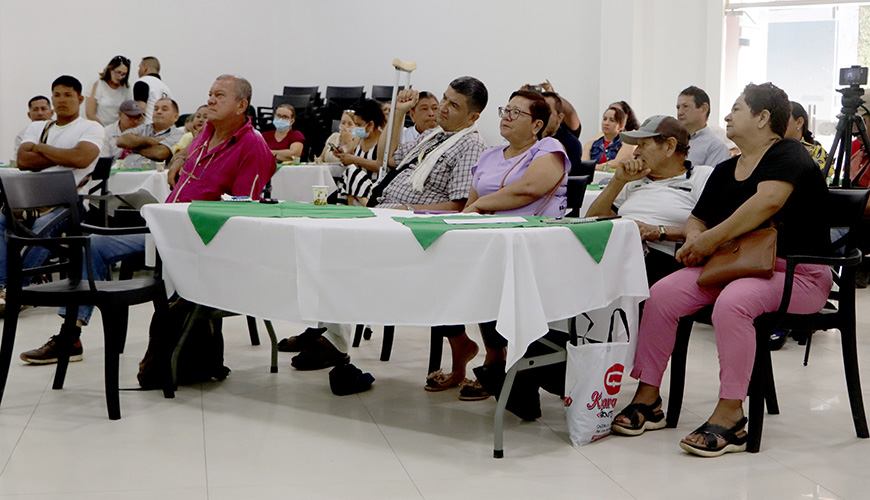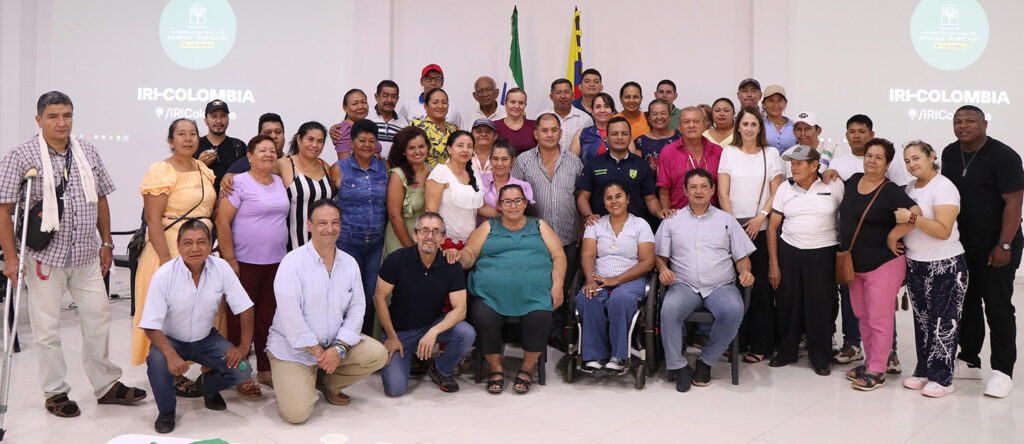As part of its advocacy strategy, the main objective of which is to make the protection of the Amazon a priority for local and regional governments, IRI-Colombia held a workshop on Development Plans for territorial planning advisors of Guaviare, on March 5 in the capital of the department.
One of the first goals of the 1,103 mayors and 32 governors sworn in on January 1 throughout the country is the formulation and approval of their Development Plans, the compass that will guide the destiny of municipalities and departments for four years.
Although these planning instruments, by constitutional mandate, must reflect the government programs proposed by the candidates when they registered for elections, citizen participation has a place during the construction process through bodies such as the Territorial Planning Councils (CTP).
As part of its advocacy strategy at the local and regional level, on March 5 in San José del Guaviare, the Interfaith Initiative for Tropical Forests in Colombia held the “Workshop on Development Plans”, aimed at the department’s territorial planning councilors.
“CTPs are a space for citizen participation and representation for planning and social control. At this time they are fundamental, because they have the tasks of discussing the Development Plan that was delivered to them on February 29 and presenting their concept no later than March 30,” said Laura Luján, an expert in participatory planning at the National Planning Department (DNP), who gave a lecture on the formation, organization and functions of the Territorial Planning Councils. “The Council must issue semi-annual concepts on compliance with the Plan,” he added.
Precisely, the possibility of presenting recommendations to the corresponding territorial entity makes IRI-Colombia’s participation in the CTPs of crucial importance to help ensure that programs and projects focused on the control of deforestation and the conservation and restoration of Amazonian ecosystems are developed. In the case of Guaviare, the Initiative will be represented for eight years in the Departmental Planning Council, by Pastor William Porras, coordinator of IRI-San José del Guaviare, for the ecological sector. In the Municipal Planning Council of San José del Guaviare, by Pastor Luz Dary Arango, a member of our local chapters in this municipality, who will represent the ecological sector as well. On the other hand, community leaders William Romero and Oswaldo Antonio Rodríguez, members of IRI-El Retorno and IRI-Calamar, are members, respectively, of the Territorial Planning Councils of these two municipalities.
According to the advisor of IRI-Colombia and expert in Development Plans, the diagnosis is the part of the Development Plan that shows how complex the reality of the municipality or department is and should include the problem of deforestation and its impact on the territory, so that the reason for the programs and strategies it formulates is understood.
During the conference on Development Plans, the former deputy director of the National Planning Department addressed, among other topics, the different stages of the process of formulating the Plans, the need to reflect not only the severity of deforestation but also the positive role of the community in the recovery of ecosystems and the importance of securing financial resources for programs. These three are the guiding principles of the initiatives presented by IRI-Colombia to mayors and governors, during a series of strategic meetings held in February 2024.
“What does not appear in the Development Plan is difficult to incorporate into the budget and, therefore, to allocate resources to it,” the expert warned the more than 50 territorial planning councilors who attended the workshop.

A challenge for the counselors
Representatives of the economic, social, ecological, educational, cultural, community and religious sectors, the territorial planning councilors also received a lecture on the seriousness of deforestation in the territory, given by Carlos Augusto Lozano.
“We are at another point in the path that we began to travel before the regional elections, when we held 16 debates and conversations with candidates for mayors and governorships,” said the national advisor of IRI-Colombia about the first stage of this advocacy strategy, which began in August 2023 and thanks to which 11 mayors and 3 governors-elect signed the agreement “A new opportunity of hope for the Amazon”, pledging to work for the protection of the tropical forests of this region.
Another of the commitments made by the then candidates was the inclusion of religious leaders, members of the local chapters of IRI, in the Territorial Planning Councils. “All of you, without exception, have a knowledge of your territory, your community or the group you represent. They are the repositories of experience and knowledge that they have developed thanks to their committed work with their communities. Forests are running out and life is in them. They are the last lung of humanity and the last shield to stop climate change and we must protect them,” encouraged the national coordinator of IRI-Colombia, Blanca Lucía Echeverry, to the counselors who participated in the workshop.


